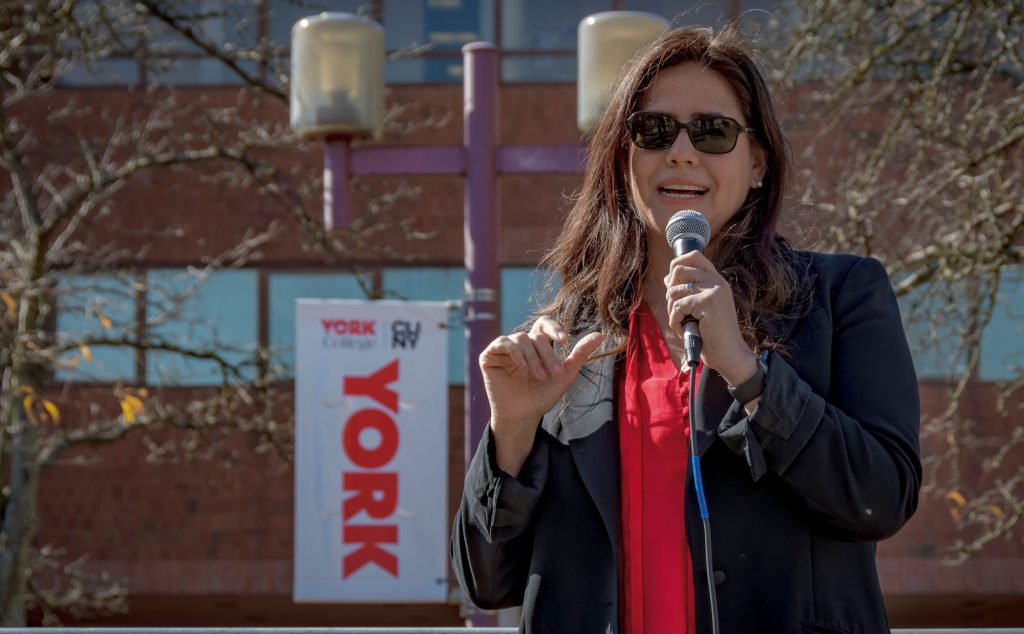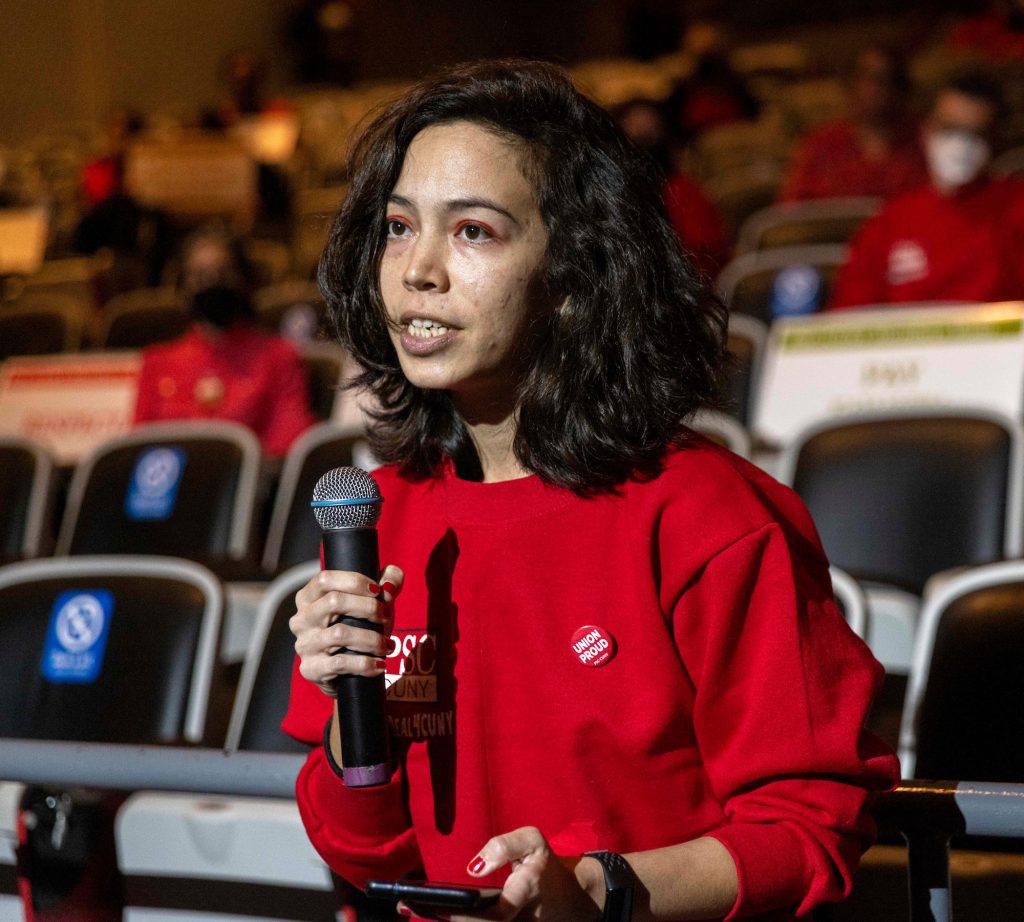
Fabiola Salek objects to CUNY’s demand that department chairs like her be taken out of the bargaining unit. (photo credit: Erik McGregor)
The union is aggressively pursuing its bargaining agenda both at the bargaining table – where members are packing the room to observe the sessions and put pressure on management – and on the streets.
On a September 28 Zoom meeting with nearly 1,000 union members, PSC President James Davis gave a critical assessment of ongoing contract talks with the CUNY administration, citing concerns over management’s unacceptable demands and its reluctance to invest in faculty and staff to ensure a bright future for CUNY.
“They cry poverty,” Davis said at the mass meeting. “The thing that CUNY needs to understand [is] the CUNY budget is not static,” Davis noted, adding, “It’s not a zero-sum game.”
MANAGEMENT PROPOSALS
The union is seeking wage increases that account for inflation. In addition, union leaders and members of the bargaining team updated members about other demands. Management has not presented a specific economic offer to the union.
Lawrence Bosket, a bargaining team member and assistant director of admissions at Brooklyn College, told members that the team has presented its demands for hybrid work, underscoring how flexible schedules increase morale and retention. “They see it as a benefit at their discretion,” he said.
Davis also criticized management’s demand to bar faculty members with union positions from serving in governance. In addition, management wants to remove many HEOs from the bargaining unit, as well as department chairs.
The latter issue was particularly irksome for Fabiola Salek, chair of world languages, literature and humanities at York College. Not only would it strip many professors of union protections and rob the union of dues money, she explained, but many chairs play an important role in fighting cutbacks at the campus level that impact faculty members. “We have a dam there that would be gone,” she said of chairs who defend fellow union faculty members from cuts imposed by the administration. “Because as chair, you can make sure there aren’t as many cuts.” At a later speak-out event at her college (see p. 4), Salek said, “I would never be a chair if I had to be administration.”
One focus of the union’s bargaining strategy is to have rank-and-file members in the room as observers. The union sees this as a key organizing tactic. Members are, in fact, eager to see what’s going on during talks and to share their observations with their colleagues on campus.
Veronica Schanoes, an associate professor of English at Queens College, was taken aback at CUNY’s desire to compare CUNY faculty and staff salaries to those at small colleges in less affluent regions well outside of the tristate area.
“What I observed was how good the PSC team was at responding on their feet to the information distributed by CUNY and what CUNY hoped to imply with that information,” she told Clarion. “For instance, CUNY distributed a document supposedly putting our salaries into the context of comparable public institutions of higher ed in the Northeast. Immediately, our team pointed out that comparing our salaries to those paid by a college in rural Maine or Pennsylvania was absurd, that we were New Yorkers, we were being charged New York prices for the things we needed, and we needed New York salaries. I very much appreciated how on the ball our negotiating team was, and how unimpressed and unshaken they were by CUNY’s transparently absurd tactics. It really made me feel even more confidence in our bargaining team’s ability to advocate for us.”
CUNY VALUES
For Renee Bell, an assistant professor of mathematics at Lehman College, attending a bargaining session was “one of the most engaging and informative union activities I have been involved in so far,” and a boon for transparent, strong and democratic unionism.
“Management was unable to conceal how far removed their values and goals were from the mission of CUNY, and how little they care about our working conditions and student learning conditions,” Bell said. “They cherry-picked data and talked out of both sides of their mouths, which suggests that they anticipated our arguments and would be unmoved by them. For example, they argued that, broadly speaking, our union-won benefits make up for the enormous salary deficit compared to nearby universities, and yet they deny both benefits, like job security, and wage parity to adjuncts.”
Bell, however, saw the experience in a positive light, because it meant that the members’ message was getting across to CUNY.
MANAGEMENT’S APPROACH
“They clearly recognize the potential power of our bargaining unit,” she said. “From the beginning, management has tried to restrict and police our presence in the bargaining sessions, and they’ve stated that their offensive demands were ‘not meant to anger anyone.’ The power of a strong demand is its ability to galvanize and mobilize members, and we should spread the word about what we are fighting for and the irreconcilable character of who we are fighting.”
Ángeles Donoso Macaya, a professor of Spanish at Borough of Manhattan Community College, attended two bargaining sessions. In the first, she reported that management was hostile to both the union’s demands at the table and to the presence of member observers.

Renee Bell says that management is showing how little it cares about faculty, staff and students. (photo credit: Dave Sanders)
“The attitude of CUNY management was somewhat dismissive,” Donoso Macaya said.
“They didn’t offer any definitive counterargument other than Columbia, NYU, and the like ‘were not comparable institutions to us.’ When we debriefed, an adjunct grad worker smartly pointed out that, in fact, these institutions were comparable to us, because many adjuncts who teach at CUNY sometimes teach the same or similar courses at these other institutions, where they make twice the money. Another moment worth evoking was when they attempted to discuss our presence in the room, which clearly made them uncomfortable.”
“[CUNY’s chief negotiator] asked James Davis how he intended ‘to control’ the audience – as if we were kids who don’t know how to behave – and how was he going to ensure that we didn’t do anything that was out of protocol.”
PROFESSIONAL DEVELOPMENT
The union has pointed to other issues in bargaining. In a recent bargaining update, leadership told members: “Troubling, CUNY management proposed structural changes to the administration and purpose of the two professional development funds for HEOs, CLTs, NTAs, lecturers, graduate assistants, CLIP and CUNY Start instructors, and adjuncts. For decades our contractual agreement has been a peer review of funding requests, administered by the union, a procedure that has successfully funded hundreds of CUNY employees each year. CUNY’s demand is for these funds, which are paid for entirely by our contract settlements, to instead be jointly administered and requests jointly reviewed. Most grants to professional staff support their attendance at conferences and professional development coursework, but CUNY seeks more direction of the funds’ expenditures. The union observed that CUNY itself is responsible for providing the professional development that the administration wants for its employees.”
NYC SALARIES
And as far as raises are concerned, the leadership said in another bargaining update: “In previous sessions, the PSC presented our demand for salary increases with reference to other major colleges and universities in the tristate area….Initially, CUNY management countered our comparisons with salary data from 278 colleges and universities across the entire northeast US. The PSC objected to the invalid, overbroad comparison, and on October 5 management responded with a narrower range of comparators within a 150-mile radius of New York City. The PSC said that despite having refocused the salary data, management’s approach remains misleading, primarily because it does not account for our high cost of living. The crux of our argument for real raises, we reiterated, is that our current salaries fail to recognize the value of the work we perform and the expense of living and working in the city.”
Members who observed the bargaining sessions said the union has been putting up an excellent fight against management. Donoso Macay said, “Overall, I believe the PSC bargaining team has been doing a great job in terms of standing by their terms, and they should continue to do so.”
Published: November 15, 2023

